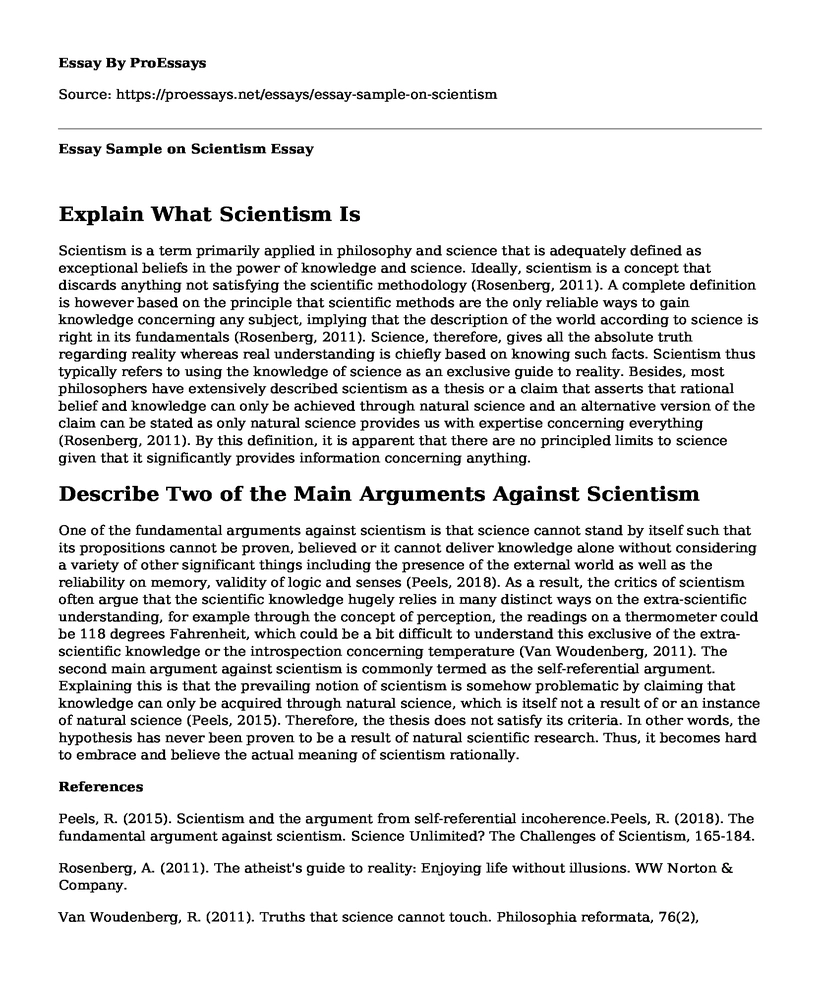Explain What Scientism Is
Scientism is a term primarily applied in philosophy and science that is adequately defined as exceptional beliefs in the power of knowledge and science. Ideally, scientism is a concept that discards anything not satisfying the scientific methodology (Rosenberg, 2011). A complete definition is however based on the principle that scientific methods are the only reliable ways to gain knowledge concerning any subject, implying that the description of the world according to science is right in its fundamentals (Rosenberg, 2011). Science, therefore, gives all the absolute truth regarding reality whereas real understanding is chiefly based on knowing such facts. Scientism thus typically refers to using the knowledge of science as an exclusive guide to reality. Besides, most philosophers have extensively described scientism as a thesis or a claim that asserts that rational belief and knowledge can only be achieved through natural science and an alternative version of the claim can be stated as only natural science provides us with expertise concerning everything (Rosenberg, 2011). By this definition, it is apparent that there are no principled limits to science given that it significantly provides information concerning anything.
Describe Two of the Main Arguments Against Scientism
One of the fundamental arguments against scientism is that science cannot stand by itself such that its propositions cannot be proven, believed or it cannot deliver knowledge alone without considering a variety of other significant things including the presence of the external world as well as the reliability on memory, validity of logic and senses (Peels, 2018). As a result, the critics of scientism often argue that the scientific knowledge hugely relies in many distinct ways on the extra-scientific understanding, for example through the concept of perception, the readings on a thermometer could be 118 degrees Fahrenheit, which could be a bit difficult to understand this exclusive of the extra-scientific knowledge or the introspection concerning temperature (Van Woudenberg, 2011). The second main argument against scientism is commonly termed as the self-referential argument. Explaining this is that the prevailing notion of scientism is somehow problematic by claiming that knowledge can only be acquired through natural science, which is itself not a result of or an instance of natural science (Peels, 2015). Therefore, the thesis does not satisfy its criteria. In other words, the hypothesis has never been proven to be a result of natural scientific research. Thus, it becomes hard to embrace and believe the actual meaning of scientism rationally.
References
Peels, R. (2015). Scientism and the argument from self-referential incoherence.Peels, R. (2018). The fundamental argument against scientism. Science Unlimited? The Challenges of Scientism, 165-184.
Rosenberg, A. (2011). The atheist's guide to reality: Enjoying life without illusions. WW Norton & Company.
Van Woudenberg, R. (2011). Truths that science cannot touch. Philosophia reformata, 76(2), 169-186.
Cite this page
Essay Sample on Scientism. (2022, Dec 14). Retrieved from https://proessays.net/essays/essay-sample-on-scientism
If you are the original author of this essay and no longer wish to have it published on the ProEssays website, please click below to request its removal:
- Critical Essay on Our Kids: The American Dream in Crisis
- Deliberations on and Suggestions for Revising Canon Four of the Code of Ethics for Engineers
- Race and Identity Essay Example
- Essay on the Question of Human Intelligence: The Causes of Controversy
- Essay Example on The American Dream: Success Through Hard Work and Sacrifice
- Essay Sample on Jeremy Bentham's Critique of Natural Rights Theory
- Moral Issues of War Police and Terrorism in America - Free Paper Example







